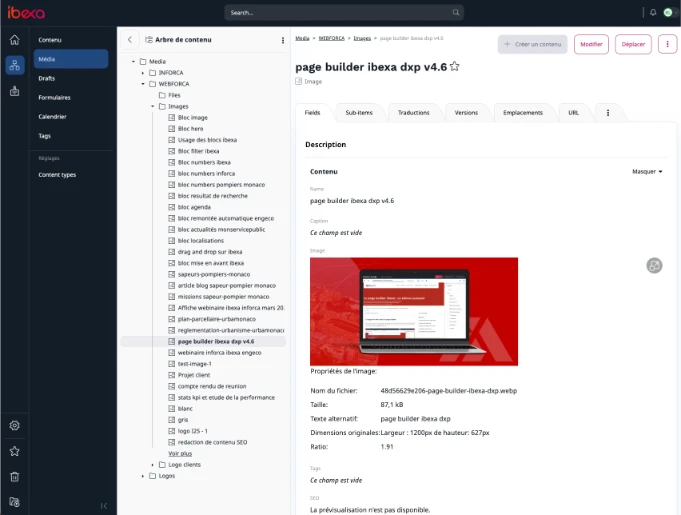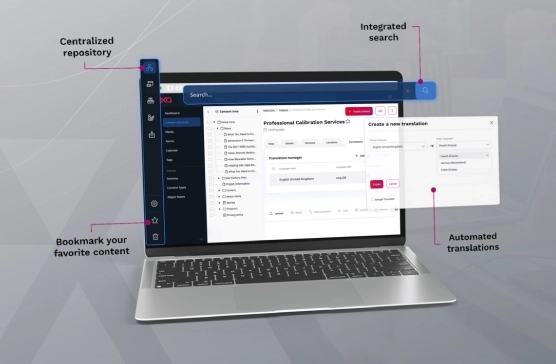

With so many players and options available on the market, choosing a content management system (CMS) can be complex. Each CMS has its own particularities, and meets specific needs. The one you choose must meet your objectives for growth, performance and flexibility, and must be able to evolve with your business. Whether you want to launch a blog, create a showcase site to present your services, or open an online shop, the choice of CMS can make all the difference. In this article, discover the most important criteria to help you select the perfect solution.
A flexible CMS allows you to create a site that matches your expectations and your company's image. You need to be able to change your theme, colours, fonts and general layout. Wordpress, Shopify and Prestashop offer pre-designed themes and templates. Ibexa DXP allows for extensive customisation of the front-end and back-end via the code.
Some CMS offer the option of adding extensions. These are additional functionalities such as contact forms, SEO optimisation tools or e-commerce tools. Extensions can enhance your site's functionality, but they can also conflict with the theme used and affect site performance.
An intuitive CMS that is easy to learn saves time and frustration, especially for users with no technical skills. The interface must be clear and user-friendly. Users should be able to navigate menus easily, add content and make changes without having to constantly consult documentation or search for online help.
Drag-and-drop functionality simplifies content creation and management. Ibexa DXP offers this functionality (see below) to structure pages by simply moving elements with the mouse, without having to manipulate code. Page layout is quicker and more accessible, even for novices.

The performance and speed of a website influence both the user experience and search engine ranking (SEO). A fast, high-performance site retains visitors for longer and improves the chances of conversion. What's more, Google and other search engines take loading speed into account in their ranking algorithms, which means that a fast site is more likely to rank higher in search results.
To ensure optimum performance, the CMS should allow you to install a cache module that stores static versions of pages to reduce loading time. Other modules can be used to optimise site resources, such as compressing images and minimising CSS and JavaScript files.
Some CMS offer 24/7 technical support. The Shopify and Wix platforms, for example, offer responsive customer support to deal with any technical problems.
The WordPress and Joomla CMSs benefit from a large community of users and developers who are active on forums and social networks. There you'll find a wealth of resources (tutorials, guides, explanatory videos). This support is useful for dealing with minor bugs and configuration issues.
Users' personal information and e-commerce site transaction data must be protected. The role of a good CMS is to ensure the security of your site with features such as data encryption and secure connections (HTTPS) to limit the risk of security breaches.
The frequency and regularity of updates means that known vulnerabilities can be corrected and security measures reinforced. The CMS must have frequent updates and a community that works to improve the system's security. For example, WordPress benefits from frequent updates and a large community of developers who contribute to its security.
For companies targeting an international clientele, the CMS's multilingual functionalities are essential. Managing content in several languages requires specific functionality to ensure an optimised user experience and good visibility on search engines.
A good multilingual CMS allows you to create and manage content in different languages. It allows pages to be duplicated, content to be translated into several languages and a consistent site structure to be maintained. Translation management should be intuitive. Some CMS include automatic translation functions (integration with third-party translation services) to facilitate this process.
An SEO-friendly CMS must include support for hreflang / x-default tags. This tag tells search engines which language version of a page to display to users depending on their location and preferred language.
Your CMS must be able to connect with your third-party tools to centralise data and automate tasks. It enables you to connect your information systems together, in particular :
Make sure that the CMS offers plugins, extensions or APIs that facilitate these integrations. Some CMS offer a vast library of plugins for various integrations, while others may require additional development.
WordPress, Drupal and Joomla offer great flexibility and a large support community. However, although they are free to download and use, they can have high overheads. For example, hosting, premium themes, paid plugins, and maintenance fees can add up.
Paid solutions such as Ibexa DXP, Shopify, Wix and Squarespace charge monthly or annual fees that often include hosting, technical support and a range of integrated features.
A paid-for CMS may seem more expensive at first glance, but it can offer a simpler, more integrated solution, which reduces maintenance and development costs. For example, Shopify is popular for e-commerce sites because it offers an all-in-one solution with a range of online sales features, integrated payment gateways and responsive customer support.
On the other hand, a free CMS such as WordPress may require more effort to configure and maintain an e-commerce site at the same level, due to the costs of plugins and their maintenance (updates) as well as hosting.
Request a personalised quote for the creation of your website now and get a detailed cost estimate.
As your business grows, so do your requirements in terms of content management and functionality. Your CMS needs to offer the flexibility to incorporate new features and adapt the structure of your site without having to redesign it.
For example, it should make it easy to add new pages, new types of content, e-commerce functionality, user management tools, integrations with CRM and marketing platforms, or subscription management systems. The ability to add and customise code allows you to meet specific and varied needs.
Your CMS must be able to handle an increase in traffic without compromising site performance. A scalable CMS must be able to handle an increased load by optimising resources and using efficient caching systems.
Some CMSs, such as WordPress, offer plugins and specialised hosting services that can help manage large traffic peaks. Others, such as Ibexa DXP and Drupal, are renowned for their robustness and their ability to manage high-traffic sites thanks to a modular and flexible architecture.
Check whether the "essential" SEO tools are integrated into your future CMS. These will optimise your site and make it easier for search engines to index it.
A responsive website that works well on smartphones and tablets not only enhances the user experience, but also improves Google rankings. A good CMS should offer features for creating responsive sites, i.e. sites that automatically adapt to the size of the user's screen. The theme you use must be flexible and responsive. Images, text and menus should fit on small screens without horizontal scrolling.
Accessibility means that websites must be usable by everyone, including people with disabilities. The Web Content Accessibility Guidelines ( WCAG ) are international guidelines designed to make web content more accessible. A WCAG-compliant CMS can be used to create websites that meet these standards. People with visual, hearing, motor or cognitive disabilities will be able to access and interact with the site's content.
A good CMS should offer tools and features to help developers and content creators comply with accessibility standards:
Your CMS should make it easy to add multimedia content to your pages and articles. You should be able to upload files directly from your computer, embed videos from third-party platforms (YouTube, Vimeo), and insert downloadable PDF documents.
Your CMS should offer a user-friendly media management interface so that you can easily organise and find your files, categorise and label them. It should allow you to create folders, manage metadata (titles, descriptions, alt tags) and preview files.

Intuitive image management in Ibexa dxp
Large images and videos can slow down page loading and affect the user experience and SEO. The CMS must offer tools for compressing and optimising media for the web.
A CMS must accept several media file formats to meet your needs. These may include WEBP, JPEG, PNG, SVG and GIF image formats, MP4 and WebM video formats, as well as document formats such as PDF.
One aspect that is often overlooked when choosing a CMS is the ability to customise the back office, i.e. the administration interface. A well-designed and customisable administration interface can improve the efficiency and productivity of your team.
Every business has unique content management needs, and the ability to customise the CMS administration interface to meet those needs can make a big difference. For example, version 4.6 of the Ibexa DXP CMS includes the ability to create custom dashboards, limit the options and features visible on the screen with focus mode.
Managing roles and permissions gives each member of the team access to the features and sections of the site that are relevant to their work. A good CMS should allow user roles to be defined with varying levels of access: from administrator with full rights to editor with limited permissions.
In some companies, the CMS must allow you to create and manage workflows that automate the processes of reviewing, approving and publishing content.
For example, a writer may submit an article which is then automatically routed to an editor for review and then to an administrator for final approval before publication.
A good CMS offers comprehensive documentation and tutorials. These resources enable users to find answers to their questions independently. User guides, FAQs and video tutorials are essential for understanding the features of the CMS and learning how to use them effectively. Most CMS offer tutorials on YouTube.

